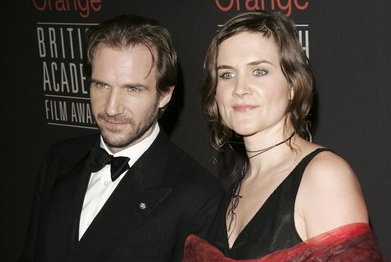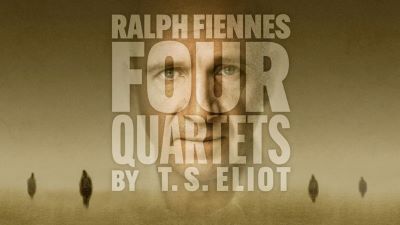Kino Lorber has acquired North American distribution rights to T.S. Eliot’s Four Quartets, a film by Sophie Fiennes of Ralph Fiennes‘ acclaimed stage production. An intimate showcase for Fiennes’ mesmerizing performance of one of Eliot’s finest works, the U.S. Premiere takes place at the Santa Barbara International Film Festival on February 9, followed by a theatrical release via Kino Lorber this spring.
One of the giants of modern literature, the poet, playwright, literary critic, and editor T.S. Eliot is best known as one of the central figures of the Modernist movement in poetry. Consisting of four poems published over a six-year period – Burnt Norton, East Coker, The Dry Salvages, and Little Gidding, each titled after the landscape that inspired their writing – Four Quartets is widely considered Eliot’s masterpiece and the culminating achievement of his career as a poet, offering four interwoven meditations on the nature of time and the quest for spiritual enlightenment. Following the completion of Four Quartets, Eliot was awarded the 1948 Nobel Prize in Literature for his profound effect on the direction of modern poetry.
In 2021, Ralph Fiennes toured UK regional theaters with a one man stage production of Four Quartets. This cinematic adaptation, filmed shortly after the conclusion of the stage production and directed and edited by filmmaker Sophie Fiennes, is an exquisite rendering of Fiennes’ tour de force performance, seamlessly transposed from stage to screen.
 Ralph Fiennes and Sophie Fiennes
Ralph Fiennes and Sophie Fiennes
Sophie Fiennes’ films have screened in festivals worldwide and received international distribution, including Over Your Cities Grass Will Grow (2010), Hoover Street Revival (2001), The Pervert’s Guide to Cinema (2006), and The Pervert’s Guide to Ideology (2012). T.S. Eliot’s Four Quartets reunites Fiennes with Kino Lorber following the release of her documentary Grace Jones: Bloodlight and Bami (2017).
“With this magnificent adaptation, Sophie Fiennes and Ralph Fiennes have transformed T.S. Eliot’s masterpiece into an utterly singular work of cinema that reaches an emotional depth unlike anything I’ve experienced just reading the poem. Four Quartets is like nothing I’ve seen on either stage or screen, with an astonishing and deeply felt performance by Ralph Fiennes at its center” said Richard Lorber, President & CEO of Kino Lorber.
“I have seen all of Ralph’s stage performances, but Four Quartets felt essential to document. Seeing it on stage left me with the sensation of having traveled far in space and time and experienced a huge world. As I left the theatre I looked back at the relatively small space where it had all happened, it seemed miraculous, impossible. In translating Four Quartets to the screen, a central aim was to retain the spatial re-inventions Ralph conjures through the poem’s own structural, tonal and narrative shifts. Kino Lorber were instrumental in making this film happen,” said director Sophie Fiennes.
About Sophie Fiennes
Sophie Fiennes was born on February 12, 1967 and raised in England and Ireland, the fourth child of photographer Mark Fiennes and writer and painter Jini Fiennes (Jennifer Lash).
As a director and editor, Fiennes’ approach often reflects a preoccupation with present-tense documentation of cultural and aesthetic worlds, and the invention of a film form specifically devised to communicate these worlds. Fiennes’ first film, Lars From 1-10, in which Lars von Trier explains the origin of ‘Dogme 95’, premiered at the Sundance Film Festival in 1998. Her first theatrical documentary, Hoover Street Revival (2003), used the sermons of Pentecostal pastor Noel Jones as a form of narration for the life of the local Compton community in Los Angeles, using these to echo the Christian narrative. It was in response to this film that Grace Jones invited Fiennes to document her life and world in Grace Jones: Bloodlight and Bami (2017), which premiered at the Toronto International Film Festival and was distributed by Kino Lorber. Fiennes is also known for her collaborations with the philosopher and psychoanalyst Slavoj Zizek in The Pervert’s Guide to Cinema (2006) and The Pervert’s Guide to Ideology (2013), with their final film, The Pervert’s Guide to Utopias now in development. Fiennes’ recent performance films, Artificial Things (2018) and Four Quartets (2022), explore the possibilities for the cinematic rendering of stage works.
Since 2006 Fiennes has edited her films, sometimes under the pseudonym Ethel Shepherd. Perceiving film editing as a form of writing, Fiennes’ films are shaped from her directly observed film material, as opposed to voice-over. Her film, Over Your Cities Grass Will Grow, which premiered at the Cannes Film Festival in 2010, is visually driven, bearing witness to German artist Anselm Kiefer’s alchemical creative processes and renders as a film journey the personal universe he built at his hill studio estate in the South of France.


